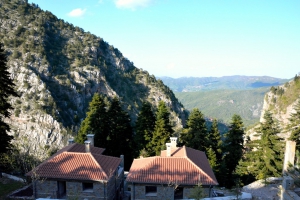LIFE & CULTURE
XpatAthens
Wednesday, 20 May 2015 19:53
Greece To Be Shown "All Over" The World For The Second Year
Greek culture, products and social entrepreneurship will be showcased all around the world from May 22 until May 31 through the 2nd “Greece All Over” International Festival.
“This is a one-week celebration of Hellenism in various countries around the world to demonstrate that Greeks can and want to work together”, organizer Ellada Pantou (Greece All Over) said in an announcement.
The “Greece All Over” festival is a collaborative celebration filled with music, poetry, dance, art exhibitions, gastronomy, product presentations, charitable actions and more which will take place in Argentina, Australia, Belgium, Germany, Greece, Ireland, China, Malaysia, Norway and The Netherlands.
Published in
Greece In The News
Tagged under
Thursday, 21 May 2015 07:00
‘Quantum of the Seas’ Super Smartship Hits Greek Shores
Shipping Minister Thodoris Dritsas, Alternate Tourism Minister Elena Kountoura and the US Ambassador to Greece David Pearce were at the port of Piraeus on Monday morning, 18th May to welcome the Quantum of the Seas, one of the largest cruisers to dock at the Greek port.
Launched in 2014, the 1 billion dollar Royal Caribbean dream ship has 2,090 staterooms plus 28 for solo travellers, 16 guest decks served by 16 lifts, 18 restaurants ranging from Asian and Italian to pub-style and steakhouse options, and a total 1,500 crew members from 68 countries serving its passengers.
But what makes the Quantum of the Seas special is the latest in technology as well as the limitless recreational activities on board including bumper cars, simulated skydiving and circus trapeze classes, a rock-climbing wall, roller-skating, basketball, a shuffleboard court, the North Star observation dock that swings daring passengers some 92 meters above the sea so they can catch a bird’s-eye view and robots mixing drinks at the bionic bar.
On a more human level, super chefs Jamie Oliver, Michael Schwartz and Devin Alexander have drawn up innovative meals for passengers, who book their meals and activities via apps.
To read more, please visit Greek Travel Pages.
Published in
Greece In The News
Tagged under
Thursday, 21 May 2015 07:00
Cod In Tomato Sauce With Potatoes
This is a very light, summer dish. You can use either fresh or salted cod. If the fish is salted, you should soak it in water for at least 24 hours, changing the water often so that the salt is washed out. A good idea is to stand the fish on a rack, so that it doesn’t come into direct contact with the salt that has settled at the bottom of the basin. If you have to feed more people, you just increase the ingredients accordingly.
Ingredients
500gr. cod, fresh or salted, cut in portions
3 medium potatoes
3 fresh tomatoes chopped (or a can of chopped tomatoes)
3 green onions
1 clove garlic minced
2 tablespoonfuls parsley finely chopped
4 tablespoonfuls olive oil
Salt, pepper
Directions
Peel and wash the potatoes, and cut them into quarters. Remove any yellow or wilted leaves from the green onions, cut off the root part, wash and slice thinly.
To read the rest of this recipe, please visit Cooking In Plain Greek
Published in
Greek Food & Diet
Tagged under
Wednesday, 20 May 2015 12:51
We Don’t Visit Greece, We Live In Greece!
Featuring
Anthea Sylbert and Richard Romanus
Costume Designer
Actor
Having spent the last forty years in Hollywood in the movie and television business on both sides of the camera, we decided to retire. When we first arrived in Skiathos we were on our way to no place in particular and had planned to stay only six months. It was the week they were changing from the drachma to the euro and all we had was dollars and nobody would accept them because the exchange rates hadn’t been established. In Richard’s book, ACT III, he mentions the moment in the second chapter:
“Climbing down the steps of the police station, I couldn’t help but laugh in disbelief. Where had we landed where without hesitation, without questioning, without exception, people opened their hearts and wallets to complete strangers?”
And we’ve never left.
We’ve been to the capital, all over the Peloponnesus, there's so much to see, Thessalonica - excellent shopping, breathless Meteori, Metsovo, which Richard used as the setting for his novel Chrysalis, and Richard has been to Mt. Athos and is returning again.
A story that we treasure most is when we stopped in Selegoudi, a small village below Sparta, which is Anthea’s ancestral home. After first thinking it deserted, two dozen relatives appeared and a large table was set for a feast, with each carrying another food or wine. During World War II and the ensuing Civil War, Anthea’s father sent a large box every week to the village containing clothes, canned goods, and toys and candies. Towards the end of the meal, an old man sitting next to Anthea leaned in and whispered “I was married in one of your father’s suits.”
To read more, please visit Discover Greece blog.
Published in
People
Tagged under
Monday, 15 April 2019 07:00
A Guide To Ordering Kid-Friendly Food In Greece
Taking your kids to a restaurant is already a challenge, especially if they’re picky eaters. Finding something they’ll like is always a daunting task, but certainly not impossible!
With these suggestions, you and your children can both enjoy the best dishes Greece has to offer. Read on for some tips about what to order the next time you’re at a Greek restaurant.
With these suggestions, you and your children can both enjoy the best dishes Greece has to offer. Read on for some tips about what to order the next time you’re at a Greek restaurant.
Simple, Basic Dishes
Let’s start with the basics. A good option is souvlaki, which is roasted chicken or pork on a skewer, usually with some roasted bell peppers thrown in as well. Souvlaki will appeal to the pickiest eater.
You could also try biftekia (burgers on the grill), which often come with french fries or potatoes baked in olive oil and lots of garlic.
Pair it with a Greek salad (also known as horiatiki salata), which tends to be popular with kids (as far as salads go). A Greek salad will have cucumbers, tomatoes, and green bell peppers chopped up with a piece of feta on top, and lots of olive oil for dunking bread.
You could also order a pita gyro, which is pork or chicken meat wrapped in a pita with tomatoes, onions, potatoes and tzatziki. We’ve never met a youngster who didn’t love it.
Eat Your Vegetables
The great thing about Greek food is that it’s packed full of vegetables. You can eat a totally vegetarian (or even vegan) meal at almost any restaurant without missing out on any flavor. And there are tons of options for getting veggies into your kids diet. Ask about what’s in season, and you can’t go wrong.
If your children aren’t wild about vegetables, then try a dish with “secret” veggies. Kolokythokeftedes (fried zucchini balls) are full of nutritious zucchini, but they don’t taste a thing like “rabbit food.” You could also try fried zucchini with tzatziki, which is a yogurt sauce packed with garlic and cucumber. It’s a fabulous combination.
Savory turnovers are a time-tested trick for getting Greek kids to eat their veggies. Try spanakopita (spinach “pie” or turnover), kolokythopita (zucchini “pie” – it’s a popular vegetable), or hortopita (wild greens “pie”).
Try Traditional Mezedes
As you can see, there’s a lot of good food in Greece. Every town and every island has its own specialty. Fruits and vegetables are at their peak when they’re in season, so you’ll get a fabulous variety the whole year round. Mezedes, or small plates, are a great way to experiment with new flavors. Order a little bit of everything. Among the best places to go for mezedes are ouzeri (ouzo shops) and tsipouradika (tsipouro is a kind of strong Greek liquor).
Eat Your Vegetables
The great thing about Greek food is that it’s packed full of vegetables. You can eat a totally vegetarian (or even vegan) meal at almost any restaurant without missing out on any flavor. And there are tons of options for getting veggies into your kids diet. Ask about what’s in season, and you can’t go wrong.
If your children aren’t wild about vegetables, then try a dish with “secret” veggies. Kolokythokeftedes (fried zucchini balls) are full of nutritious zucchini, but they don’t taste a thing like “rabbit food.” You could also try fried zucchini with tzatziki, which is a yogurt sauce packed with garlic and cucumber. It’s a fabulous combination.
Savory turnovers are a time-tested trick for getting Greek kids to eat their veggies. Try spanakopita (spinach “pie” or turnover), kolokythopita (zucchini “pie” – it’s a popular vegetable), or hortopita (wild greens “pie”).
Try Traditional Mezedes
As you can see, there’s a lot of good food in Greece. Every town and every island has its own specialty. Fruits and vegetables are at their peak when they’re in season, so you’ll get a fabulous variety the whole year round. Mezedes, or small plates, are a great way to experiment with new flavors. Order a little bit of everything. Among the best places to go for mezedes are ouzeri (ouzo shops) and tsipouradika (tsipouro is a kind of strong Greek liquor).
To read this article in full, visit Kids Love Greece
Published in
Kids Life
Tagged under
Wednesday, 20 May 2015 07:00
Hellenic Seaways Announces Summer 2015 Ferry Schedules To Greek Islands
Passenger shipping company Hellenic Seaways has announced its new ferry schedules for travel to the Northeast Aegean islands this summer, following approval by the Ministry of Economy, Infrastructure, Marine and Tourism.
The new routes will begin on June 15 and cover this year’s whole tourist season. According to the Greek shipping company, the connection of the specific islands will create strong growth prospects both for local communities and for tourism, as the combination of destinations is expected to increase passenger traffic.
To read more, including routes and schedules, please visit: Greek Travel Pages
Published in
Local News
Tagged under
Tuesday, 19 May 2015 07:00
Greek Potato Stew / Patates Yahni
Made with just 5 ingredients with one pot in just under an hour, this traditional Greek potato stew (πατάτες γιαχνί) is rustic potato perfection. Red ripe tomatoes, fresh parsley, sweet red onions, minced garlic and yellow potatoes simmered in olive oil combine to create one of the simplest, most authentic and amazingly delicious Greek dishes you will ever enjoy!
Yellow potatoes seem to work very well in this recipe and much better than, say, red potatoes which just seem to fall apart here. You need a heartier potato that’s able to soak up all the amazing flavors of the sauce while still remaining intact. And I recommend peeling your potatoes with this recipe. Leaving the peels on takes away from the finished dish for me but you’re welcome to keep them on if you prefer. Thick slices of potato are my favorite and really give you a meal as opposed to just a side dish, though you can certainly serve it either way- I love a side of patates yiahni with Chickpea fritters (revithokeftedes)!
It’s important to remember that because there are just a few ordinary ingredients in this recipe, you need to make sure they’re the best quality. Ripe, juicy tomatoes and Greek olive oil are must haves in addition to fresh (not dried) parsley which brings such a brightness to this hearty potato dish. I use chopped fresh tomatoes because they make for a sweet and light tomato sauce but in a pinch you can use canned whole peeled tomatoes. If you do go with canned, drain off as much of the liquid as possible before chopping. Do not go with crushed or pureed tomatoes as your sauce will be much heavier and not nearly as light as it should be.
To read more, including ingredients, please visit: Greek Vegan.
Published in
Greek Food & Diet
Tagged under
Monday, 18 May 2015 11:19
Small Version Of ‘The Runner’ Appears On Myconos
A few years ago, Costas Varotsos’s emblematic glass sculpture “The Runner” had to cover the distance from Omonia Square in central Athens, where it was originally placed, to a tiny square facing the Hilton Athens Hotel, where it stands today.
These days a 3-meter-tall copy of the 12-meter original gazes out over the Aegean Sea from a luxury property on the cosmopolitan Cycladic island of Myconos.
Turkish businessman Ugur Ozkan had stayed at the Hilton Athens in the past and observed the original “Runner” from his room. Finding himself under its spell, he subsequently went in search of the Greek artist and commissioned him to create a smaller version of the work for his Myconos villa.
“Ever since the story broke in the local press a few days ago my phones have been ringing nonstop,” the artist told Kathimerini, adding that he “never expected that something which was created two years ago would become the subject of such publicity today. In fact, I had never been commissioned to create a smaller version of a large-scale public sculpture. ‘The Runner’ has an urban quality about it; it is a work especially conceived for display in the city. It had never crossed my mind that it could grace a private residence. It took me a while to execute, but when I saw the end result and the exact spot that was chosen for its display, I must admit that I liked it. Especially when the wind is blowing and the sea gets rough.”
For more on this story, please visit ekathimerini
Story by Margarita Pournara
Published in
Local News
Tagged under
Tuesday, 19 May 2015 07:00
Travel Bloggers Greece Explores Greece’s Mountain Getaways
TBG discovers Montanema Handmade Village hidden in the Pindos Mountains
Travel Bloggers Greece selected to visit the Montanema Handmade Village in Central Greece to experience “another face of Greece” that combined mountain hiking, village excursions, local gastronomy and lake activities.
Several outdoor excursions included a guided hike in Agrafa Mountains to its famed waterfalls and horseback riding at the Saloon Stables along Lake Plastiras. TBG also experienced a “farm-to-table” tour. The bloggers milked sheep, gathered eggs at a family farm in Frago, toured the fifth-generation Pyrotzello flour mill and helped make traditional Greek egg pasta called hilopetes at the Karagouna pasta factory. Throughout the trip, members dined at Montanema’s Fournia restaurant sampling specialties prepared with local meat, dairy products, herbs, spices, fruits and vegetables.
“The idea for the village was planted 15 years ago when the owner was hiking and stumbled upon a little home built in the forest hidden in the lush mountainous landscape. He envisioned Montanema and today his dream is a reality. It opened last year as a unique accommodation that reflects the natural beauty of this area of Greece. Now, Travel Bloggers Greece can share that experience with their international readers and followers,” said Artemis Kokkinou, Village Hostess of the Montanema Handmade Resort.
The mountain’s steep slopes meld in harmony with the 33 apartments and suites that were built with an eco-friendly, bio-climatic architectural design.
“Our travel bloggers loved exploring the mountainous nature of Greece,” said Elena Sergeeva, co-founder of TBG. “Montanema’s hospitality has enabled us share the incredible nature and culture of Central Greece with our photography, social media activity and our travel writing.”
Also at Montanema, TBG member and photography blogger, Dimitrios Asithianakis, taught the group’s first educational workshop: You and Your DSLR Camera.
“We aim to collaborate and help educate each other so we can all be better travel bloggers,” said Marissa Tejada, co-founder of TBG. “Like Montanema, we look forward to sharing more authentic experiences on our international blogging and website platforms that focus on travel and culture in Greece.”
About Travel Bloggers Greece (TBG): TBG is the first blogger networking group established in Greece based on a core set of professional values. Members are Greeks and expats who live in Greece and cover Greece as a travel destination in various languages. TBG members abide by ethical standards and encourage positive cooperation, education and collaboration. TBG works with Greece-based businesses to help promote authentic travel and increased awareness of Greek travel destinations. For more information visit: www.travelbloggersgreece.com
The following TBG member blogs participated in the trip to Montanema Handmade Village:
A Greek Adventure http://www.agreekadventure.com
Family Goes Out http://www.familygoesout.com
Life Beyond Borders http://www.lifebeyondbordersblog.com
Meet Culture http://www.meetculture.com & http://www.meetculture.cn
My Greece, My Travels http://mygreecemytravels.com
Passion for Greece http://www.passionforgreece.com
Published in
Travel Greece
Tagged under
Monday, 18 May 2015 07:00
Russia Seeks Medical Tourism In Greece
Representatives from the Moscow Chamber of Commerce and Industry recently met with the Greek Tourism Minister, Elena Kountoura, to discuss possible cooperation to expand medical tourism in Greece. It would be part of an effort to strengthen Greek-Russian relations. Representatives from Russia said that the Greek market would be a top destination for Russian citizens for various medical and health services.
During the meeting, Minister Kountoura presented the various opportunities in the health tourism sector in Greece, placing emphasis on the high-level of scientific staff and specialized rehabilitation centers. Minister Kontoura also mentioned that the Greek government is working with the Greek Medical Tourism Council (ELITOUR) and industry professionals to set up working groups to move medical tourism forward in Greece.
For more on this story, visit All About Aviation and Greek Travel Pages
Published in
Greece In The News
Tagged under














